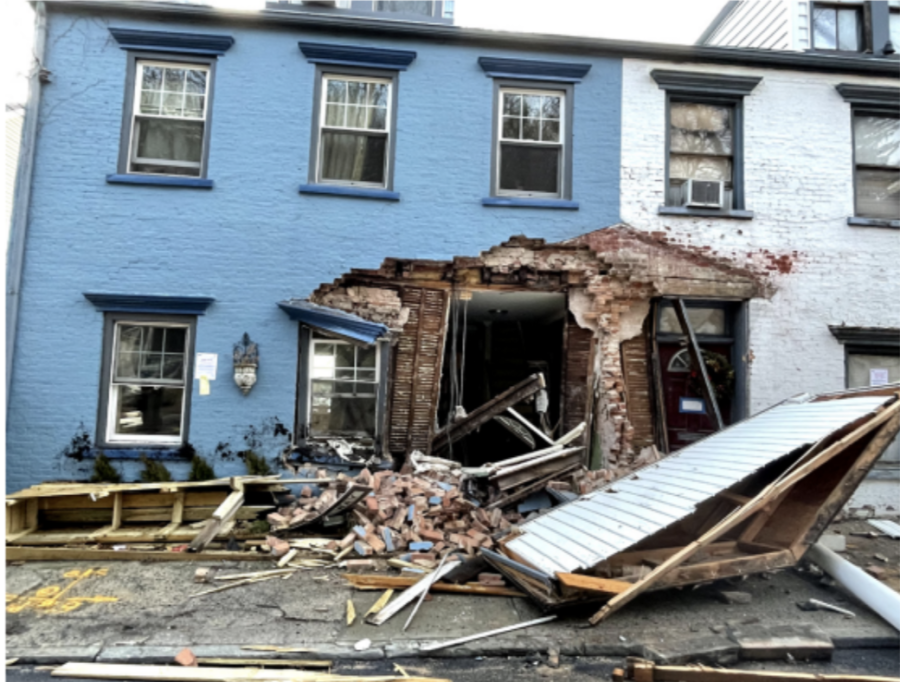Poly Spanish Teacher’s House Struck by Driver
At 3:30 a.m. on March 3, “a man with drugs in a car was driving away from the cops in the rain, then when the man went down the hill, the car spun in a big puddle and then the car crashed into our house,” said Inés, 11, the daughter of Maité Iracheta, a Poly Spanish teacher of 16 years. In the middle of the night in early March, a driver carrying illegal drugs crashed straight into the front of her family’s Staten Island dream home, essentially obliterating it.
“I was violently pushed out of bed to what felt like a dream sequence, as halfway into a nightmare,” Iracheta said. Her head had been only a few feet away from where the car had crashed. “I felt dust covering my face and its thick taste in my mouth. When I opened my eyes, the street was right in front of me, there was no wall in between, and the lamppost revealed heavy rain falling down.” Iracheta was sleeping on the couch in the living room because her parents, who had flown in from Mexico the day before, were staying with them in her bedroom. Her daughters Inés, Carmen, 14, and Micaela, a Poly graduate from the class of 2016 who was home from Michigan for spring break, were also home.
Everyone was very disoriented at first. Micaela thought there had been an explosion. Meanwhile, “Inés was shaking and my grandparents, who arrived [Wednesday] night from Mexico, were so confused and lost,” said Carmen, who thought a glass had fallen and shattered. “I heard my little sister cry … so I ran downstairs from my room and looked down [from the second floor] at my living room. There were bricks everywhere.”
“From the inside, the house looked like it had just been bombed … and from the outside it look[ed] like someone had wrecked it with a wrecking ball thing,” said Inés. Half of the front of the house had been completely destroyed. The debris was a collection of “brick, glass of windows and a tall mirror, wood, door, metal … the fat collection of dictionaries that have walked with me through life, files and personal stuff of all kinds and ages, letters from my children, books that I’d been studying, and 52 handwritten notebooks,” said Iracheta. The car had hit the house so hard that it bounced back onto the street.
At first, “there was nothing but the sound of rain. It was eerie.” Eventually, the fire department, more police, and an ambulance began to arrive. They helped everyone out of the house. Iracheta went down to the basement––Micaela’s room––to get dressed before going out and helping the authorities with information and how to bring the rest of the family down from the second floor. “It was very hard to coordinate my mind and body to wear the shoes, the clothes,” she said. “I was shaking, and I kept on saying ‘Wait, wait’ over and over, as if that could suspend or interrupt what was happening.”
The morning that followed was “extremely busy and overwhelming, a continuous stream of phone calls, coordinating with home insurance, hotels, family members, and reporters,” said Micaela. The neighbors came out to see the damage and brought Iracheta and the family blankets, beanies, umbrellas, and tea. The Red Cross came as well. Mike, one of the neighbors across the street, had caught footage of the crash on his Ring Doorbell security camera.
Everyone was scared. “I was very concerned about my parents and the girls, especially Inés, who didn’t stop shaking for an hour,” Iracheta said. Inés said she felt scared and worried because she didn’t know what had happened, but she “was especially worried about my two cats.” They found their dog immediately. One of the cats was found later that morning thanks to a firefighter and the second was found when it returned to its wrecked home weeks later.
Micaela was overwhelmed and terrified, but also “utterly devastated for my mom, who spent years saving to get a beautiful little home she could call hers. Home is supposed to be a safe haven, that one place you feel completely secure in.”
“As a teacher, mother, and friend, she devotes her time to helping and loving others,” said Micaela. “But witnessing firsthand how my mom handled this tragedy––with grace, gratitude, and virtually no complaints––my admiration for her has grown and expanded in ways I didn’t think it could.”
For the first few days after the crash, Iracheta and her family stayed at a hotel. Then she was in a temporary apartment in Crown Heights until April 8, more than a month after the crash, when she moved into another more permanent temporary apartment. “Our belongings have shrunk to three pieces of luggage, plus the limonero (lime squeezer) and the comal (Mexican tortilla warmer). And a handful of odd things that seemed to mean something back on that early morning,” she said. Inés and Carmen have been going to school and are mostly staying at their dad’s house in Brooklyn.
In the days after the crash, one of Micaela’s friends set up a GoFundMe for the family. Created without Iracheta’s knowledge, it made her uncomfortable at first. The GoFundMe has since garnered more than $33,000. “My daughters were better at understanding this extraordinary support than me, and they’ve taught me how to accept our fragility and the generosity of our friends … The Poly community has been amazing,” said Iracheta. Using the metaphoric language she often uses, she compared it to “angels gathering in an army of solidarity.”
Things are slowly getting better as the family is getting used to the situation. “We just have to live with it and let time smooth things out,” said Carmen. Iracheta’s dad, who had come from Mexico to celebrate his 80th birthday, “thinks this is all part of life’s great adventure. He’s an impossible optimist.” Iracheta tries not to think too much about why this happened to her family.
Last week, the NYC Department of Buildings and the insurance company said that it might take eight months for the home to be restored.
“I think frequently of the house fire in Sergei Tarkovsky’s film The Sacrifice,” said Iracheta.
“[There’s a] big difference in the why and the how, of course, but there’s so much lightness in our existence to be considered, to be cherished and, allow me this verb: to be metaphored. The pear and the peach trees that we’d planted in our backyard are blooming flowers right now. Why is it we can’t be under their newborn shade? Yet, we close our eyes and see them.”



























